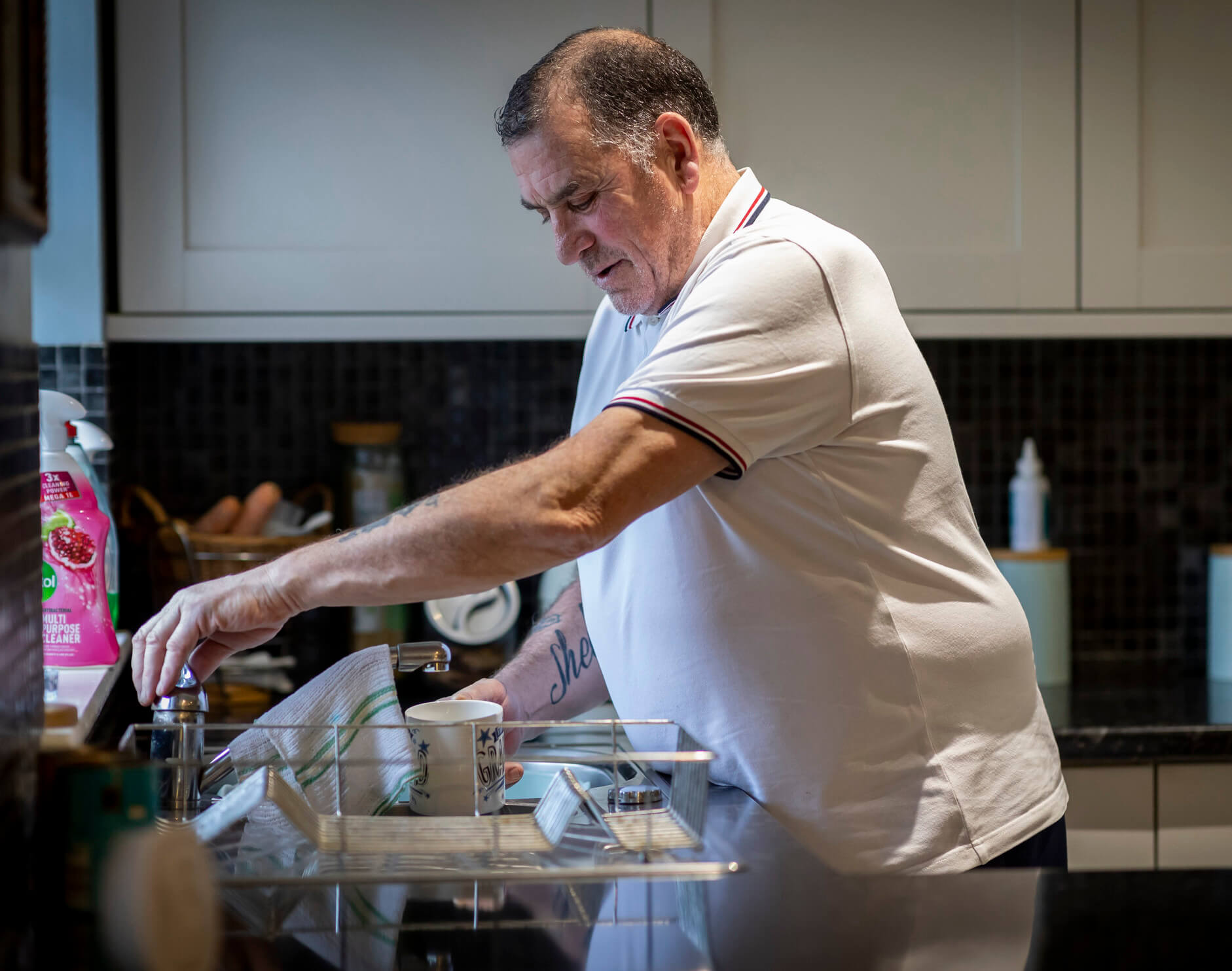Visiting care – your complete guide to home care visits
Tags
Visiting care
Are you looking to learn more about visiting care? In this guide, we’ll explore when this care solution might be suitable, the different ways you can arrange it, and what to expect during your first home visit.
What is visiting care?
Unlike a lot of care terminology, ‘visiting care’ is fairly self-explanatory. It’s a type of home care where a professional carer pays regular visits their clients at home to provide personal care and practical support. This can include things like help with bathing, dressing, medication management and keeping the home clean and tidy.
Whether you need a few care visits a week, or someone to call around multiple times every day, a visiting carer will fit into and support your regular routine. And, support doesn’t just have to happen in the home either. Many visiting carers are more than happy to pop to the shops, accompany their client to medical appointments, or join them for a gentle walk in the park.
Visiting care is also sometimes called ‘hourly care’ as it’s commonly booked in hour-long periods, and carers are paid by the hour.
When should I consider visiting care?
There’s no textbook ‘right time’ to get help at home because everyone’s care journey is different. However, below are some reasons people may consider additional support from professional visiting care services.
- When an an older person is experiencing mobility, balance or coordination problems e.g they’ve had bad fall, or are falling or tripping more frequently.
Falls at home
Approximately one-third of people over 65, and half of those over 80, fall at least once a year. And one in eight preventable deaths in England and Wales involved a fall.
- When a loved one is showing signs they’re finding daily tasks difficult. For example, you may notice a change in their personal hygiene, or that they’re repeatedly wearing the same clothes. They may seem thinner or more frail if they’re finding it difficult to prepare food. And, if they’re struggling to stay on top of household chores they may avoid visitors or become withdrawn from family or friends.
- When they’re leaving hospital after an operation or illness, and need some additional assistance to support a smoother recovery.
Leaving hospital
A loved one may be unable to leave hospital if they don't have adequate care in place at home. In fact, in February 2024 an average of 13,662 patients a day were stuck in hospitals despite being medically fit to leave.
- When they’re struggling with memory problems such as forgetting to turn appliances off, or missing appointments.
- You’re a family carer looking to take a break from providing care or support, and need to arrange some respite care while you’re away.
- When an older person may have additional disabilities or conditions that make later life more difficult to manage without regular help or welfare check-ins.
- When a health condition begins to reduce a loved one’s quality of life.
- When household tasks become too difficult to manage alone safely, such as cooking and cleaning.
- To provide peace of mind for family members who live far away
- To support an older person’s social life, and prevent them from feeling isolated or becoming housebound.
Visiting care or the care home?
Care is a very personal decision – not every option will suit everyone, and it can take a bit of time to accept that help is needed. Often, people tend to think of care homes when considering later life care, and this can be a good option for people with mid to high level needs. Residential care homes usually offer a good selection of amenities on site – such as a canteen or a hairdresser, a strong community feel, and care home staff on call 24 hours a day.
However for people with lower needs, the routine of a care home may feel too restrictive. Care home residents often have to adjust to set arrangements for visitors, fixed menus and meal times, and rules around pets, meaning they may not suit people who are used to doing their own thing. It can also be quite distressing for an older person to leave the familiar surroundings of their own home, especially if they can still manage independently some of the time.
It’s important to consider what’s really important to the person needing care when making a care decision.
What are the benefits of visiting care?
- Helps people to stay independent in their own homes
- Can lighten the load and improve family life
- It's often a lower cost care option
- Provides tailored, personalised support
- Flexible - book visits whenever you need them
- Can be arranged as on-going or short term support
- Get consistent companionship from a familiar carer or team of carers
Exactly how visiting care works and the benefits it gives you can vary across providers. Elder’s visiting care service delivers all the benefits listed above. Find out more here.
The previous visiting care provider I used would often mix up my schedule. For example, they would show up at the wrong time or day, which was very annoying. When I raised the issue, no changes were made. Whereas, with Elder, they quickly respond to queries, and the system feels efficient and organised. I am very happy with Elder. .
Cath, Elder customer
What would be involved in setting up the first home care visit?
Working out your budget
Costs for visits lasting 1+ hours a day can range from from £20 to £30+ per hour. This may increase over bank holidays depending on which care provider you choose. It’s also worth checking whether your carer drives, and if you need to factor in additional travel costs for if you’d like them to drive your loved one to appointments or activities.
If you’re considering an hourly care service, it’s highly recommended to speak to your local council about help with your care costs. You may be eligible for full or partial funding depending on the level of care your loved one needs and your financial situation.
You’ll be asked to complete a care needs assessment and a financial assessment, and if found to be eligible, your loved one will be given a personal budget (the total amount the council with pay towards your care).
The council will work with you to agree your adult social care options and create a care package. During this process you may decide that you’d like complete control over who provides your care, if so, you can request a direct payment from the council, and arrange care yourself. This gives you more choice over who provides your care. You can find more information about getting the council to help with care fees and social care visits in our guide to funding options.
If your loved one is living with or has recently been diagnosed with a chronic illness, or have been told they’ll need palliative care in the future, they may be eligible for full NHS care funding. Your healthcare team will be able to arrange your assessment for this.
If your loved one isn’t eligible for social care funding and will be paying for care themselves, there are ways to unlock additional payment streams to make the costs a little easier to manage. You may also decide to split care between a professional or private carer, and a family member to make it more affordable too.
Find a local home carer with Elder
Find a local home carer with Elder
Elder is an award leading platform that matches self-employed carers to families and older people needing a wide range of support.
Elder is an award leading platform that matches self-employed carers to families and older people needing a wide range of support. With Elder you can –
- Choose the same carer or team of carers for your home visits
- Control exactly what tasks your home carer helps with and when
- No upfront fees or bank holiday surcharges
- Choose the same carer for each visit
- Control how and when your carer helps you
- No upfront fees or bank holiday surcharges
Choosing a visiting care provider
Whether you’re going with private agencies or local authority care providers – choosing who manages and delivers your care needs careful consideration. Ask for information on each provider’s standards of care and Safety and Trust policies, to understand exactly what you can expect day to day and how they operate. It’s also important to know if they provide back up carers, and what the process is if a carer falls ill or is unable to make it at the scheduled time.
Consider your medical needs too
Not all visiting carers will be able to assist with certain medical tasks safely. Some tasks, such as assisting with stomas or catheters require specialist training, while others, such as administering controlled medications should really only be performed by a nurse.
While some care companies will do their own risk assessment or clinical checks for your safety, you may also want to think about all potential care scenarios – including where things could go wrong, and what to do in an emergency. While the worst case scenario rarely happens, planning ahead can give you extra peace of mind. It can help you create a contingency plan detailing important care information and contacts, and keeping this somewhere safe.
And, if you or a loved one is particularly vulnerable to infections, or finds it more difficult to recover from illness, you may want to request that your regular carers have undergone additional infection control training. It’s also worth asking for detailed guidance on their protective measures such as protective equipment (PPE).
You’re well within your right to ask about the precautions and adherence to infection control that agency carers are taking to reduce the spread of the viruses, or any potential germs. This can include whether they’ve had their primary dose, secondary dose, and booster vaccinations for COVID-19. With Elder you can view this information on each carer’s profile before choosing your carer.

How do I prepare for a home visit?
Before the first day of care, run through your care plan with the care agency if you’re using one, or directly with your new carer if you’re using a company like Elder. Don’t be afraid to speak your mind about how you like things done during the day, and what would make you most comfortable. Even if your visiting carer will only be there for a short time, it’s still important that they have all the information they need to provide a personalised care experience.
It’s also important to factor in any additional care provided by your friends or family. For example, if a family member calls round in the evening to cook and eat dinner with your loved one, it may make sense to arrange your home care visits to be in a morning, or afternoon time slot.
It’s worth remembering that when arranging visiting care through an agency, it’s not always possible to have one dedicated carer, instead, you may be supported by carer team. This is usually due to staff rotation and changing shifts, as well as the number of people in your area using the service.
To make the most of your time with your care staff, keeping the things they need such as cleaning products in obvious places i.e a dedicated cupboard in the kitchen, can be a big help. It can also help to make a list ahead of time of any particular tasks you do or don’t need help with that day.
What does a carer do during a home visit?
A visiting care professional’s main responsibility is to provide essential care and support that improves quality of life.
Typically, each daily visit will usually last an hour or so, however the duration of visits should reflect and meet your needs. Visits can happen a few times a day, and during these visits a carer will help with a wide range of things, including –
- Personal care – help with washing, toileting, prompting medication, etc.
- Welfare checks – ensuring safety and wellbeing
- Companionship – providing company and encouraging hobbies and interests
- Housekeeping – vacuuming, keeping surfaces clean and doing laundry
- Mobility support – encouraging gentle and suitable movement
They can also provide specialist care for conditions such as early-stage dementia, and osteoporosis. Of course, the exact role your carer plays in your loves one’s daily life will be tailored to their individual needs and the everyday tasks they find most difficult.
What does a home visit nurse do?
There are some advanced care tasks that care specialists won’t be able to help with, and that are better suited to nursing care.
For example, if you’ve recently left hospital you may need regular blood pressure monitoring, or have a dressing or a wound drain that needs proper management.Your medical team may arrange for weekly home care visits from a registered nurse. You can usually have this in place alongside hourly home care.
If you have a stoma or catheter, a home visit nurse can check the skin around the site it is healthy, and help treat infections. This is particularly important if you’re still adjusting to managing your stoma or catheter.
The administering of medication should also only be done by a registered nurse, or by the person taking the medication. This is to reduce the potential for medication errors, such as taking the wrong dose at the wrong time, or taking it on an empty stomach. If you’re living with a condition that makes it difficult for you to take your medication yourself, such as dementia or stroke, visiting nursing care may help you manage your condition in your own home, rather than moving into residential care.
Read more

Active Leeds – how older people can stay active and meet new friends
Regular physical activity isn’t just about keeping fit—it’s about maintaining our independence, enhancing our mental health, and improving our overall quality of life. While our

Meals on wheels in Leeds – getting quality meals delivered locally
Even if you love to cook, preparing meals can become more challenging in later life. Lifting heavy pans, using knives and exposure to extremely hot

Carers rights day 2024 – Get the support you’re entitled to
Each year Carers UK holds Carers Rights Day to raise the voice of the UK’s 5.7 million unpaid carers and raise awareness about caregiving rights.

Home help for the elderly – daily admin support
When you think about the type of care and support a person may need in later life, you may think of personal care tasks, such

Visiting care – your complete guide to home care visits
What to expect during a home care visit From hourly care from a professional care worker, to regular nursing visits – find out how to

Elder fraud and scams – staying safe in later life
Fraud can happen to anyone, but sadly vulnerable people and those over pension age are regularly targeted. A report by Age UK indicates that almost